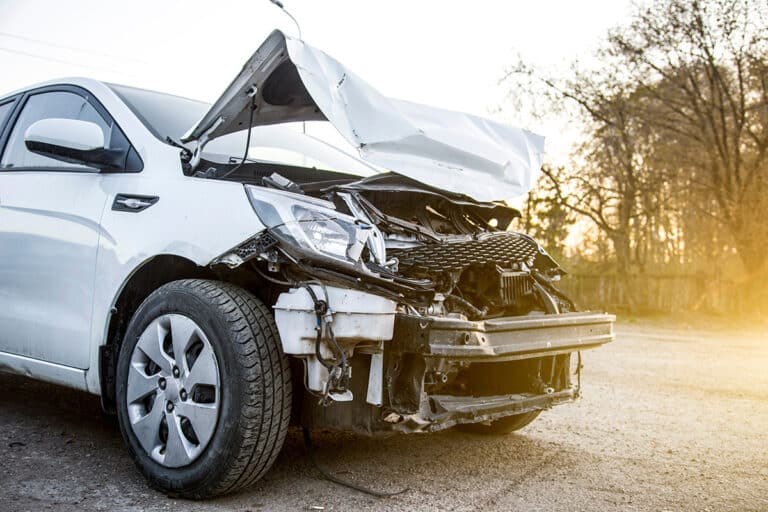As Americans hit the highways this summer, one would be remiss not to notice the fleet of tractor-trailer and big rig semi-trucks joining us on those same highways at all hours of the day. We are taught in driver’s education how to safely drive with and around these big trucks. For example, if you cannot see their side mirror – they cannot see you, these trucks take a longer time to stop, and they take wider turns. Unfortunately, driver’s education stops there. It does not teach most people what to do when the unthinkable happens and they are in an accident with one of these behemoths of the road. This article is designed to help you understand these collisions and what needs to happen to best preserve your claim.
-
Get Treatment As Soon As Possible: The Severity of the Injuries and Damage Tends to Be More Severe
Trucks can weigh 20,000 pounds or more without towing a trailer and can weigh up to 80,000 pounds when hauling a load. This is significantly more than the average passenger vehicle that weighs 5,000 pound on average. This difference in weight causes more significant forces to the occupants of the passenger vehicle resulting in more significant injuries and damages. The injuries that a victim of a semi-truck collision suffers from can significantly impact the rest of their lift. Common injuries in a trucking accident can include:
| Head Trauma | Traumatic Brain Injury |
| Concussion | Neck and Back Injury |
| Broken Bones | Burns |
| Internal Injuries and Bleeding | Smoke Inhalation |
| Spinal Cord Damage | Death |
-
Investigation into the Cause of the Crash: Why did the accident happen?
When looking at a normal car crash, what happened is typically straight forward (i.e. did not stop in time, distracted driving, running a red light, etc.). It is not always that simple and straight forward in a trucking case. The Federal Motor Carrier Safety Administration (FMCSA) has a primary mission to prevent commercial motor vehicle related fatalities and has set forth safety rules and regulations to make it safer for commercial vehicles to be on the road. Failure to follow these regulations result in increased harm to the driver and others on the road. Some of those regulations include:
- 391 – Qualifications of Drivers à Sets minimum qualifications of drivers and standards for disqualifying drivers.
- 392 – Driving of Commercial Motor Vehicles à Requires pre- and post-trip inspections, prohibits driving based on the physical condition of the driver if ill, fatigued, or whole ability or alertness is impaired by drugs, medications or alcohol, and other important standards.
- 393 – Parts and Accessories Necessary for Safe Operation à Describes necessary safety requirements for the condition of the commercial vehicle, including brakes, lighting, and warning reflectors.
- 395 – Hours of Service of Drivers à Provides the maximum on-duty and driving hours a driver can log, including being only permitted to be on duty 60/70 hours in any period of 7/8 consecutive days, taking 10 hours off between driving shifts, and not driving for more than 8 hours without a 30 minute break.
Unfortunately, despite these safety regulations, trucking companies often place a high priority on the speed of delivery and put pressure on their drivers to comply with short time frames to deliver goods. This all too often results in improper working conditions that are a common factor in causing these crashes. For example, drivers have been known to fall asleep at the wheel from driving too much in violation of these regulations. Additionally, trucking companies have been known to not comply with ensuring the qualifications of its drivers in accordance with the regulations. Some of the most common reasons for semi-truck accidents include:
- Negligent driving (i.e., speeding, texting, not paying attention, wide turns, etc.)
- Driving while tired or drowsy
- Driving in an aggressive manner
- Driving at excessive speeds
- Disregarding weather conditions
- Driving when the truck has been overloaded
- Driving with unbalanced cargo
- Driving a truck that has not had the proper maintenance
- Driving under the influence of drugs or alcohol
Thus, a thorough investigation needs to occur to determine the cause of the accident. This includes obtaining and reviewing trucking logs, safety records from the trucking company, maintenance logs, and the driver’s safety record, hour logs, and any training or licenses.
-
Insurance Limits: How this Differs from Private Car Insurance?
Every vehicle on the road is required to have insurance should the driver of that vehicle cause a crash and injuries. Every state has minimum requirements for passenger vehicles on the road. In Colorado, those requirements are $25,000 per person and $50,000 per accident. When you are involved in a crash with a commercial motor vehicle that amount increases exponentially – to a minimum of $750,000 in liability coverage per accident as required by the FMCSA.
Most companies are insured above and beyond this amount. However, the limits are not always sufficient to be able to fully compensate all injured parties for their injuries, damages, and losses – particularly given the seriousness of the injuries sustained in trucking accidents. Therefore, it is important to look at the assets of the trucking company to see if they have assets to cover additional damages in excess of the insurance policy. Additionally, you still have access to your own personal underinsured motorist coverage (UIM) to supplement your recovery should your damages exceed what is available from the trucking company.
-
Get an Attorney Early on After the Crash: Stopping Critical Evidence from “Disappearing”
Unlike in the average motor vehicle collision where an injured person can wait to get an attorney, that should not be the case where a semi-truck or commercial vehicle is involved. It is important to get to an attorney who is knowledgeable in trucking cases in order to preserve all evidence from the crash and regarding the truck and driver. Trucking companies have been known to send investigators and experts to the scene of the accident to protect their driver and the company. Trucking companies can also destroy or alter evidence, intentionally or not. This could include altering the log books or evidence at the scene and deleting emails or other communication that encourages drivers to violate hour and sleep restrictions.
Trucks additionally have an Event Data Records (“EDR”) that acts as a vehicle “black box” which records vital information regarding crashes or accidents. This EDR data needs to be downloaded and preserved before it is erased. Therefore, an attorney should get involved early on in a case to assist you with preserving all of this evidence and putting the trucking company on notice that they need to make sure critical evidence does not disappear or get altered. In addition to ensuring evidence is not destroyed, the attorney can assist you with the investigation into the crash, communicate with the insurance companies, answer any questions specific to your situation, and assist you with obtaining the medical treatment that you need.
If you or someone you know was involved in an accident with a semi-truck or commercial vehicle, our experienced attorneys here at Ogborn Mihm LLP can help you with your crash and can help you maximize your recovery. We can advise you on a wide range of issues, including making sure you are fully compensated for your vehicle, how to talk to insurance companies, making sure that you are getting the best medical treatment possible. We work on a contingency fee basis, which means there is no legal fee for hours worked on your case unless we recover compensation for your injuries.







